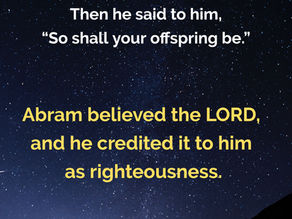Genesis 1:24-27 - Created To Be Like God
- Chad Werkhoven
- Jun 16, 2025
- 4 min read
Salvation restores what sin stole: your divine likeness.

Genesis 1:24-26 (NIV)
24 And God said, “Let the land produce living creatures according to their kinds: the livestock, the creatures that move along the ground, and the wild animals, each according to its kind.” And it was so. 25 God made the wild animals according to their kinds, the livestock according to their kinds, and all the creatures that move along the ground according to their kinds. And God saw that it was good.
26 Then God said, “Let us make mankind (ʾā·ḏām) in our image, in our likeness, so that they may rule over the fish in the sea and the birds in the sky, over the livestock and all the wild animals, and over all the creatures that move along the ground.”
27 So God created mankind (ʾā·ḏām) in his own image,
in the image of God he created them;
male and female he created them.
Canons of Dordt
Article 1: The Effect of the Fall on Human Nature
Human beings were originally created in the image of God
and were furnished
in mind with a true and sound knowledge of the Creator and things spiritual,
in will and heart with righteousness,
and in all emotions with purity;
indeed, the whole human being was holy.
However, rebelling against God
at the devil’s instigation
and by their own free will,
they deprived themselves of these outstanding gifts.
Rather, in their place they brought upon themselves
blindness, terrible darkness, futility, and distortion of judgment in their minds;
perversity, defiance, and hardness in their hearts and wills;
and finally impurity in all their emotions.
Summary
The summary section is paraphrased from The Expositor's Bible Commentary, by John Sailhamer
The creation of humankind is set apart from the previous acts of creation by a series of subtle contrasts with the earlier accounts of God’s acts. First, in v. 26, the beginning of the creation of humans is marked by the usual, “And God said.” However, God’s word that follows is not an impersonal (third person) “Let there be”; rather, what is used is the personal (first person) “Let us make.”
Second, throughout the previous narrative each creature is made “according to its own kind." But the account of the creation of humankind specifically notes that the man and the woman were not made “according to their own kind.” Rather, they were made “in God’s image." They are not merely like themselves, they are also like God; they share a likeness to their Creator.
Third, the creation of humankind is specifically noted as a creation of “male and female” (v. 27). The author has not considered gender an important feature in his account of the creation of the other forms of life, but for humanity it is clearly of considerable importance. Thus the narrative puts heavy stress on the fact that God created man as “male and female.”
Fourth, only humanity has been given dominion in God’s creation. Humankind’s dominion is expressly stated to be over all other living creatures: those of the sky, sea, and land.
Why the author has singled out the creation of humankind in this way? One answer is that the author intends to portray him as a special creature marked off from the rest of God’s works. But the author’s purpose seems to go beyond merely marking humankind as different from the rest of the creatures; the narrative is also intent on showing that humans are like God. As much as they are not like the other creatures, they are to that extent also like God.
Dig Deeper
The Canons help explain the significance of being created imago Dei (in the image of God).
Upon creation, mankind was furnished with:
A true and sound knowledge of the Creator and things spiritual - Adam & Eve had the perfect ability to know God in a way unblurred by sin;
In will and heart with righteousness - Man was created with the ability to perfectly obey God and fulfill His covenant requirements;
In all emotions with purity - The first recorded effect from sin was emotional: Adam and Eve felt ashamed at their nakedness. The sudden appearance of fear and shame highlights what was previously absent: before sin, emotions were uncorrupted.
Indeed, the whole human being was holy - Holy in every sense of the word; Man was not just flawless and without sin, but separate and different from any other aspect of creation. They were completely whole, and in a state of shalom with their Creator.
Every aspect of the gospel is focused on restoring what sin ruined: Once regenerated, people are called to repent - to think, feel and act differently; Christ supplies the perfect righteousness needed to satisfy God's covenant; It transforms our feelings from lusting after sin to rejoicing in righteousness. Ultimately, the gospel makes you holy and places you once again at peace with God.
ACKNOWLEDGE WHO GOD IS: Our Father, who made you in His image;
ALIGN YOUR LIFE WITH GOD'S WILL: Pray that you will steadily grow in sanctification to become the holy image bearer you were created to be;
ASK GOD FOR WHAT YOU NEED:
Read the New Testament in a year! Today: Philippians 1



















Comments